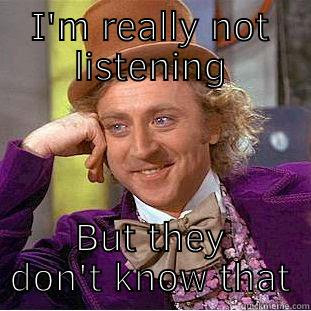I’ve been reading a lot about employee voice and silencing in organizations and there’s a phenomenon I haven’t really seen discussed explicitly in the literature, though it’s possible I’ve missed something since I wasn’t doing a comprehensive lit review (apologies if I missed something!). I don’t know if I am coining a new term here, but I wanted to talk a little about “listening theater,” a behavior (tactic?) I’ve seen exhibited by some managers. “Listening theater” is when a manager appears to be seeking out feedback from their staff, but none of that feedback is ever taken seriously or used. They have one-on-one meetings with their direct reports where they ask questions that would almost make you believe they care about what you think. They create surveys and collaborative documents to collect ideas. They ask for feedback at meetings and offer open forums when you can come and share your thoughts with them. And while you can totally understand how your ideas wouldn’t always be taken into account, you start to wonder why you and your colleagues’ feedback is rather consistently ignored. It begins to feel surreal and almost Soviet. It’s a performance of listening. Like “I’m listening, but also, these things you’re telling me are going into a black hole because I will never act on or respond to them in any way.” I once watched as all the librarians in an organization critiqued a charge for a committee only to see that charge put into practice as it was without any of the suggestions we’d made and without further explanation. The message we received is that our insights and suggestions (for a committee many of us were and would be serving on) didn’t matter. Why ask if you’re not going to act on any of the suggestions?
Employee voice (an employee’s willingness to speak up about things) has been shown to be a critical element of successful workplace functioning in study after study. If the people who have the most contact with patrons don’t feel like the information they share will ever be acted on, they will stop sharing it. And the organization suffers for it, because the people making decisions are those with the least contact with patrons and they no longer have the benefit of learning from their staff. Over time, most staff who never feel heard stop making suggestions. Maybe they just start doing things without asking, they focus on the areas of their work where they still have any agency, or they check-out and stop caring. Staff feel invisible and disenfranchised and unsurprisingly morale goes into the toilet, but I think managers like this rarely recognize that it’s their fault because they have always listened to and sought feedback from their staff.
So, why does a manager engage in listening theater? I can think of two reasons. First, the manager may actually care about the points of view of their staff, but not more than their need to be in control. They may want to do the right thing, but are more driven by their own fear. These are often box-checking bureaucrats who are far more concerned with what the people above think of them than with doing what is right for their staff (or even patrons). Second, the manager might just be an autocrat who wants people to think they are a collaborative leader so they play-act listening. Both situations are toxic for the organization. A good manager can’t white-knuckle the work; they have to trust in and empower their staff. They have to hold the reins loosely and give their staff a REAL voice in the future of the library. We’ve got to let go of the idea of manager as “boss.” A good manager recognizes that they are there to serve their staff and help them be successful. They should feel more accountable to their staff than to the people above them. I’ve worked with many different kinds of managers, and the place I worked that was the most nimble and user-focused was unsurprisingly the one where the director was keen to hear from everyone and where all staff felt like their perspectives were really taken into account in future planning (regardless of status in the org). When you feel like you’re sharing ideas into a void, eventually you stop sharing ideas.
I think also, some managers are so on autopilot that they ask for feedback because that’s just what is done, rather than out of an honest desire for information. In an era where listening sessions and open fora abound and yet workers are feeling even more alienated from management, administrators really don’t seem to be getting the message that you shouldn’t bother to ask for feedback if you’re not actually going to use it. I really appreciated this from my buddy Dustin Fife (an awesome academic library director in Colorado) in the book A Starter’s Guide for Academic Library Leaders: Advice in Conversation:
I have found that openly seeking feedback stops many problems before they begin. As I always like to say though, I only seek feedback when I am actually open to it. I try to be honest about where I stand in a process. I do not try to trick people into agreeing with a position I have already chosen. I try to be genuinely open to input, and if I’m not, I try to make that clear (although my door is always open).
This all really seems like common sense, but clearly so many organizations are missing the memo. Before asking for feedback, consider why you want to do that and how you plan to use what you learn. If you don’t have any plan for actually using the feedback, don’t ask for it. There is nothing worse than taking the time to thoughtfully provide feedback on something only to be completely ignored. The Code4Lib editorial team recently did this in an egregious case where they asked a privacy expert for her labor (with almost no lead time) to provide feedback on an article that they chose to ignore. Not a good look, Code4Lib.
A manager who is really concerned with diversity, equity, and inclusion knows that making progress on this work requires empowering and giving voice to those with the least power in the organization. But in places with fearful or autocratic management, you sometimes see the (often White) people at the top running DEI work and deciding how that learning and engagement will trickle down to the (often more diverse) staff, some of whom may actually even have experience with this sort of work in other settings. It makes no sense. It’s insulting and infantilizing. And then these managers are surprised when BIPOC library workers leave and why they are often met with stony silence in these meetings where they are boss-splaining antiracism. Remember that I in DEI? That’s inclusion, and, strangely, people don’t feel included when they don’t feel heard.
“Listening theater” feels like gaslighting. In the moment, you might really feel like you’re being heard, but when your manager never takes action on anything you’ve discussed, you begin to feel like a ghost — like you’re talking to someone who literally doesn’t see or hear you. You question yourself — are your suggestions terrible? Really stupid? Is your manager just humoring you in the moment? Maybe there’s something wrong with you. You start to feel too embarrassed to bring things up (because clearly your ideas are truly awful). Hopefully you have colleagues you feel comfortable talking with so you can learn that everyone is feeling the same way, but if you don’t, listening theater can lead you to lose faith in yourself. It’s demoralizing and it’s so much worse for the people in the most precarious positions in the organization who constantly feel like they have to prove their worth to someone who doesn’t really hear them.
This is a difficult organizational culture to survive if you find yourself unable to either care less or leave. Even when I was in an abusive organization that literally made me want to kill myself, I couldn’t make myself not care about the library. It’s excruciatingly painful to be passionate about your work and keep trying to make things better and never be heard. You need to find ways to take care of yourself. At some point, you have to accept that in the absence of a leadership change, there are some things you will not be able to change. Stop arguing with a brick wall. Let some things go. Find the spaces where you have some autonomy and ability to do good, meaningful work. Find spaces outside of your library where you can do work that speaks to your values. And for the things that you are deeply passionate about, try to organize your colleagues to collectively advocate for change in that area. Your boss still might ignore everyone (lord knows, I’ve seen my college administration do it to our union time and again!), but it certainly feels better to be in good company. It’s through good, supportive relationships with our colleagues that we can weather these hard times. I’ve always found strength in solidarity with my colleagues, even in the darkest times.
Managers, if people in your organization are telling you that they don’t feel heard or seen, that they don’t feel like they have a voice in the organization, you need to change. But people may also not tell you that directly. They may feel so demoralized that their response is to check out. So you should look for the silences. If you find that the people with the least privilege in your organization are often silent in meetings, you have a problem in your organization (it’s also possible that those silences are caused by other problems like rigid hierarchies, but any silences should cause some serious soul-searching for managers). And this is not something that is easily fixed. When people have been convinced by your behavior that their voice is not worth hearing, it’s going to take a lot to convince them otherwise. It takes honesty and vulnerability from leadership, transparent communication, and truly and visibly giving your employees more power in the organization. I think empowering committees of non-managers with decision-making capacity around things that were previously decided by managers is a great place to start. More surveys, more collaborative docs, and more open forums where people can share ideas is not going to cut it. I’ve never actually heard of a library manager who effectively turned the tide on this and I think that’s because these types of managers are usually too ruled by fear to let go of anything. But I’d sure like to believe it’s possible. It’s also hard as a manager to come into an organization where employees have felt silenced by a previous manager. You may not have caused the silence, but it will take a lot of trust-building and actively putting employees into positions of influence and power to bring their voices back. Be patient and remember it’s not about you, but also, do the work.
Silences in organizations often say a lot more than what is actually being said. A good manager will try to understand what those silences are saying. How do you encourage employee voice? Have you seen a manager with this problem change to encourage employee voice? Have you joined an organization as a manager where you had to encourage employee voices that were long-silenced? I’d love to hear stories and strategies!
Update: Allie Carr from CSU San Marcos kindly shared with me this terrific article “Are You Being served? Embracing Servant Leadership, Trusting Library Staff, and Engendering Change” by Yvonne Nalani Meulemans and Talitha R. Matlin, which discusses listening as performative and has some terrific advice for managers. She also recommended “Nice White Meetings: Unpacking Absurd Library Bureaucracy through a Critical Race Theory Lens” by Lalitha Nataraj, Holly Hampton, Talitha R. Matlin, and Yvonne Nalani Meulemans, which describes a lot of toxic elements of library bureaucracies and is one of my favorite recent articles as well! Callan Bignoli from the Olin College of Enginerring also recommends Sarah Ahmed’s latest book Complaint. The Six-Step Guide to Library Worker Engagement by Elaina Norlin was also mentioned as a possible antidote to listening theater. And as I have said probably a million times, read and watch Kaetrena Davis Kendrick’s work! No one has explored the impact of toxic leadership the way she has. Also, I wanted to give credit to Kat Bell for writing about what she called “listening session theatre” on Twitter in October, which I hadn’t seen until after I wrote my post. Whitney Townsend called it “performative listening,” which is also brilliant and I found that the amazing Celeste Headlee (whose book Do Nothing is absolutely terrific) used that term back in 2020.







Thank you for this Meredith, I definitely recognise “listening theatre”! Year after year of being “consulted” in lots of different ways, but never actually heard. In my experience, I’m sure the library director meant well through all of it, and believed that it was important to ask for employees input regularly, but felt free to ignore what was said – the actual taking notice of what was said was completely absent. Almost worse was when the senior management team would respond to things that came out of this listening theatre – comments twisted and dismissed, a paternalistic sense of them “knowing best”, rather than trying to genuinely listen and respond.
I agree that a lot of this does come from managers who mean well; I don’t know if that’s worse. I think puts staff in the position of always feeling like maybe, just maybe, they can get through to their manager. And when it doesn’t happen, again, they feel demoralized. With college-level listening sessions, I always debate whether to go because they feel performative, but there’s always the tiny voice in the back of my head saying “maybe this time your voice will matter.” So frustrating. I think you’re right that paternalism plays a big role too.
Thanks, Meredith. While the term “listening theater” is new (and a great way to talk about it), I think you’ll find some of what you describe in these articles:
https://cjal.ca/index.php/capal/article/view/34340
https://journals.tdl.org/llm/index.php/llm/article/view/7399
Thanks for sharing these, Allie. I’ve added those, as well as a few that were mentioned on Twitter, to this post.
I identified with this article so much. I’m working in this atmosphere right now and it is so frustrating. The only thing I would add from my own experience is that some people are deeply invested in their jobs as a central part of their identity. Unfortunately, when that job is managing the whole library, that means the entire enterprise becomes an extension of that identity, leaving little room for employee voices and ideas. I wish this issue was being talked about more, but it was heartening to read this article and know that I’m not alone.
I’m sorry to hear you identified with this, but you make a great point. Just like it’s healthy for library workers not to make work the central part of their identity, the same is true for managers if not more so. I’ve definitely seen and experienced empire-building library leaders who focus solely on projects that are highly-visible to external audiences and marginalize the voices and work of those who are not focused on fulfilling the vision of that leader. I even once attended a forum for candidates for a leadership position where the person said their goal was to become “a thought leader” in _____. Ugh! I’m grateful not to work for an empire-builder now, because the constant sense of urgency and the focus only on their goals is exhausting and demoralizing.
This post is spot on. Makes me feel less alone. I have been in this profession for decades and this problem has always been around but it seems to have gotten a lot worse recently. I have spoken up in meetings when no else speaks up and I end my contribution by saying to my colleagues, “If you have something to say, I would love to hear it. Please join me in speaking up.” Still, no one makes a peep. I wish they would talk, but I don’t blame them for staying silent. It does not feel safe, this is so true. Then, when one recent meeting was over, we were all put into a wildly different organizational structure created to “break silos.” Oh, how I’m dreaming of retirement.
Pingback: So I’m a conspiracy theorist now? A call for retraction | Information Wants To Be Free
Pingback: Suggested reading and listening on leadership, power relations and more – Karen Marie
Pingback: Universal design for work? | Information Wants To Be Free